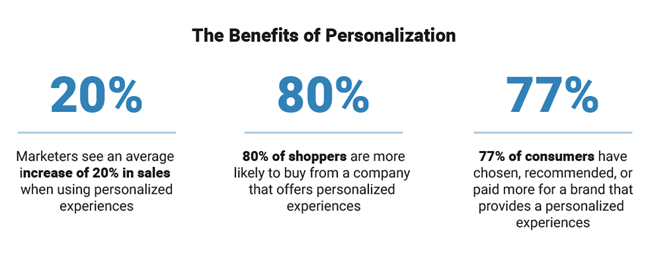There are numerous reasons that make eCommerce one of the most competitive industries in 2021. For instance, the relatively low barrier to entry means that if you have a website and access to a post office, you can start selling online. However, this also means that everyone else can do the same too. As a result, eCommerce has been incredibly successful and its adoption rate continues to increase across both B2B and B2C markets.
This level of market saturation leads us to the question, how can eCommerce businesses personalize their market offering and stand out from the rest in 2021? Well, the answer, like it always has been with eCommerce, is customer service. But in this article, we’ll discuss a new method of leveraging customer service to create a competitive edge – conversational AI.
IMAGE: UNSPLASH
The Role Of Conversational AI In eCommerce Customer Service
According to a recent survey, 93% of online shoppers will make repeat purchases with a business, if they have excellent customer service. Furthermore, customers don’t just want customer service, they want fast customer service. In fact, 90% of customers rate an immediate response as important or very important. In essence, customer service can make or break an eCommerce business. So why isn’t every business rushing to improve its customer service? Because it can be expensive.
Immediate and 24/7 customer service has traditionally meant hiring a staff that is on call 24/7 or outsourcing your customer service to cater to different timezones, but neither option is very affordable due to the human element. Today, however, there is a far more economical and straightforward option to improve eCommerce customer service – conversational AI.
Conversational AI refers to a specific branch of artificial intelligence that focuses on training computers to speak to customers in a conversational manner. Conversational AI existed for a long time, powering computers like the famous IBM Watson but it’s only recently that the technology has become affordable for eCommerce businesses. So how does it work?
The premise behind conversational AI in customer service is that is creating a viable substitute for the human element in eCommerce customer service. Software based on conversational AI is far more capable than traditional chatbots and their algorithms can be trained to identify and answers hundreds of different questions. Furthermore, with the advent of machine learning, the era of conversational AI bots capable of learning new answers is also on the horizon.
How Companies Are Implementing Conversational AI
There are numerous ways conversational AI is being used by companies in line with current B2B eCommerce trends. Following are some of the most popular implementations:
1. Automated Cross-Selling
Upselling and cross-selling are both effective and popular strategies for improving average cart value and overall sales/profits. The most common method of implementing these strategies, especially in online stores, is to suggest other products at different parts of the sales funnel – however, it’s not the only strategy, and arguably not even the most effective.
More recently, conversational AI is being used to add a greater level of personalization to product recommendations by taking into consideration individual consumer behavior and buying habits. Since AI is already a core part of this technology, businesses can leverage the AI capabilities to process large amounts of consumer data and fine-tune the timing and frequency of recommendations as well as the recommended products themselves. Finally, all of this can be automated to minimize administration overhead and staff costs.
2. CRM And Loyalty Programs
Another area of customer service that can significantly benefit from conversational AI is in automating many workflows related to Customer Relations Management as well as in loyalty programs. There are third-party CRM platforms on the market but they can be costly and vendor lock is a major concern. To overcome these challenges, businesses can use conversational AI to communicate with customers using numerous triggers (such as delivery updates, order confirmation, cart abandonment, etc).
Additionally, businesses are also using conversational AI to improve enrollment in loyalty programs by personalizing messaging beyond just changing names and by making custom recommendations and rewards a possibility. Conversational AI also goes hand-in-hand with big data analytics ensuring the system evolves as the business grows.
3. Website Support
A website is one of the necessities of an eCommerce business and also a significant source of traffic and more importantly, customer queries. To ensure those queries are answered in a timely fashion, companies adopting conversational AI bots that customers can use for a wide variety of tasks. For instance, some can be programmed to not only answers questions but also help with site navigation and even suggest products based on the customer’s needs.
4. Innovative Mobile Applications
Conversational tech on mobile applications works in a similar way as websites but can be made more capable. In general, conversational tech on smartphones can be implemented either as an inbuilt bot within the shopping app or a standalone dedicated app. The former does everything a sales representative would but the latter is where things get interested.
Standalone customer service applications using conversational tech can be used to create recommendation powerhouses, personal assistant apps that can make appointments and check inventory, apps that simulate product usage such as Sephora’s makeup assistant that simulates different products on your selfie.
5. Business Messaging
Business messaging is the new frontier that conversational tech is currently expanding. Traditional business messaging usually involves SMS and emails but neither of them is very effective with poor open rates and a lack of personalization. Conversational tech aims to change that with the help of platforms such as Google RCS, Facebook Messenger, Android Messages, etc.
All of these platforms will support rich two-way messaging which means you can communicate with your audience with images, videos, and audio and they can connect back. Consumers can ask questions, buy products, write reviews, and much more, directly from their messaging app of choice.
Benefits Of Personalization In eCommerce [With Stats]
Personalization has always been one of the core tenets of great customer service in brick-and-mortar shops but as online shopping becomes the go-to form of shopping, businesses need to find an efficient way to bring this personalization to numerous online platforms.
There are numerous benefits of personalization for eCommerce businesses such as increasing conversation rates that directly improve sales figures as well as increased customer retention. In fact, according to a recent study, personalizing shopping experiences led to a 20% sales increase.
Furthermore, personalization has a major impact on brand loyalty, with 80% more likely to buy from companies that offer a personalized customer experience. This is a significant increase in customer loyalty that ensures customers stay with your company even as the market evolves. Personalization has a dramatic effect on brand perception with the popularity of social media.
A survey from Forrester found that 77% of online shoppers chose, recommended, or paid more for brands that offered a personalized shopping experience. In other words, one great customer experience will create a positive brand image in potential customers’ minds as the word spreads.
Conclusion
So there you have it, a major technical innovation that enables eCommerce businesses to not only personalize their communication and customer service but also do it economically. That said, it’s important to remember that despite its benefits, conversational tech is still relatively new which gives early adopters the first-mover advantage and a distinct competitive advantage in the customer service department. In essence, the faster you act, the bigger the advantage.
Author Bio: Dmitry Gritsenko is the CEO of the Master of Code Global. He offers expert content on the biggest AI trends of 2020. And his company partners with the world’s leading brands to design and develop AI conversational experiences across mobile, web, and AI-powered chatbots. You can tweet Dmitry @dimasmoc or connect with him on Linkedin.
If you are interested in even more business-related articles and information from us here at Bit Rebels, then we have a lot to choose from.




COMMENTS